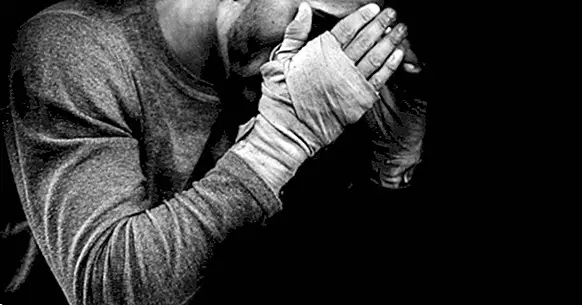What is the syndrome of overtraining and what are its symptoms
Physical condition and health is important . Nowadays there seems to be a greater awareness of this aspect, and physical exercise is even fashionable, but it happens as with everything, that an excess can involve certain risks.
Increasingly, people who complain of extreme exhaustion, whose causes derive from an excess of physical exercise without sufficient rest periods for the recovery of the body, come to therapy. To this it is added that maintaining the muscles, the form and overcoming the brand on a daily basis, becomes an obsession that maintains a compulsive behavior.
Therefore, in this article we will see what the overtraining syndrome consists of , as well as its symptoms and main characteristics.
- Related article: "What is Sports Psychology? Know the secrets of a growing discipline"
What is overtraining syndrome?
Overtraining syndrome is a set of symptoms that appears due to an excess of physical exercise without adequate recovery time . Fatigue, insomnia, depressive symptoms and stress are some of its symptoms.
The excess of sport together with the demands of work, family, emotional state and inadequate nutrition favor its appearance.
This syndrome usually occurs in athletes or elite athletes, but sometimes people who do not devote themselves professionally to sports they develop compulsive behavior around physical exercise , an addiction to sports that can influence in which exhaustion or overtraining syndrome is reached.
An important fact to add is that people with overtraining syndrome they are more vulnerable to infections, due to the weakening of their immune system . What is positive in principle, both physically and psychologically, can be distorted if it leads to obsession. A good example of addiction to sport is vigorexia.
- Maybe you're interested: "Why exercise improves your psychological well-being"
Main symptoms
Let's see what they are Symptoms of overtraining syndrome .
Physical symptoms
These are the physical repercussions of overtraining syndrome.
- Respiratory problems.
- Hypotension
- Loss of weight and appetite .
- Muscle pains.
- Increase in heart rate and blood pressure.
- Digestive problems.
- Physical fatigue .
Psychological symptoms
Among the most common psychological disorders associated with this syndrome are the following.
- Low mood, even depression .
- Anxiety.
- Physical and emotional exhaustion.
- Low self-esteem .
- Difficulty to face the daily problems.
- Low attention and concentration capacity.
- Insomnia and nightmares
- Irritability .
- Inhibition of sexual desire.
Psychological treatment
The psychological treatment addresses the causes of the appearance of overtraining, that is, What are the factors that have predisposed physical exercise to become an obsession . In this way, it is about assessing the state of self-esteem, work and family burdens and personality traits such as over-exigency and perfectionism, often related to addiction to physical exercise, for treatment throughout therapy.
From the psychological point of view one of the possible causes may well be, in some cases, the compensation of certain deficiencies , as an unsatisfactory personal development, low self-esteem and the stress of everyday life, with physical exercise.
The treatment of anxiety and low mood is also fundamental so that the person recovers the confidence in itself and retakes the motivation . Special emphasis will be placed on resuming physical exercise progressively, ensuring that its maintenance alternates with a correct physical and psychological recovery, counting on the patient's social and personal context: work, family, etc. demands. and its coping tools.
Bibliographic references:
- Asensio García, Concepción. //www.efisioterapia.net/articulos/sindrome- sobretraining
- González Boto, René. Tuero de Prado, Concepción. Márquez Rosa, Sara; "Contributions of psychology in the study of overtraining in sports". //www.infocop.es/view_article.asp?id=993
- González-Boto, R., Miller, O. and Márquez, S. (2006). Overtraining in competitive sport: psychological implications of the imbalance between stress and recovery. Anxiety and Stress Magazine. 12 (1), 99-115.



















